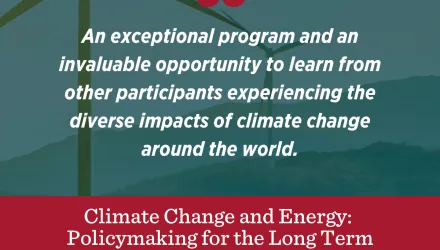The full discussion paper is available for download here: http://belfercenter.ksg.harvard.edu/publication/18553/
OVERVIEW
Climate change raises difficult issues of justice, particularly with respect to the distribution of burdens and benefits among poor and wealthy nations. To illuminate these issues, this paper focuses on the narrower question of how to allocate greenhouse gas emission rights within a future international cap-and-trade system. In particular, it highlights shortcomings in an approach that is often advanced on fairness grounds: a per capita allocation in which emissions permits are distributed to nations on the basis of population.
DISCUSSION
In an international cap-and-trade system, participating nations would agree to an overall "cap" on emissions and each nation would receive a share of total emission rights or permits under the cap. The allocation of emission rights would not bear on the effectiveness or efficiency of the program, but it would have important distributive impacts.
The two approaches most commonly considered for allocation are based on existing emissions and population. A pragmatic argument can be made for the former on grounds that it would more likely win the support of wealthy and powerful nations. But this approach also violates basic notions of fairness and could be seen as limiting the economic development rights of poor nations. By contrast, an allocation that awards equal emission rights on a per capita basis strikes many observers as inherently more equitable and responsive to welfare concerns. Under this approach, countries with high per capita emissions (such as the United States) would lose relative to countries with large populations but low per capita emissions (such as China).
The intuitive appeal of a population-based allocation may tend to obscure its practical and theoretical weaknesses. But close examination in light of several complicating factors — including the lack of correlation between population and wealth, the differential benefits of climate-change abatement in different countries, and the realities of governance in many poor nations — reveals potent shortcomings. Understanding these shortcomings may shed light on better approaches to reconciling climate change and justice concerns.
KEY FINDINGS & RECOMMENDATIONS
- A variety of approaches could be used to allocate emission rights among nations. Allocations based on population or on redistributing wealth are generally more equitable than allocations that award permits on the basis of current emissions. In choosing among approaches, however, feasibility must also be considered. Poor nations that are especially vulnerable to climate change may have the most to lose if insistence on principle precludes agreement in practice.
- A per capita allocation, while preferable to an emissions-based allocation, would not in practice satisfy objectives of fairness and welfare redistribution. The argument that every individual person should be entitled to the same emissions rights seems intuitively compelling. But it fails along several dimensions when one considers the following:
- Not all large countries are poor and not all small countries are rich. A per capita allocation would give some rich and populous countries a large share of emission rights. Conversely, while populous countries with low per capita emissions (like China and India) would certainly benefit, some even poorer countries with small populations would lose.
- A complete assessment of the impacts of an international policy must take into account the benefits of climate-change abatement, as well as the revenue effects of permit allocation. If the aim is to equalize impacts, not just permit endowments, the different environmental benefits that accrue to different countries under the policy must also be considered. A citizen of Russia, for example, can expect to benefit less from greenhouse-gas reductions than a citizen of India (because warming is likely to be far more negative for India than for Russia). If both get an equal allotment of permits, the net result is not 'fair' because the Indian citizen benefits more from the policy than the Russian citizen.
- Transferring wealth in the form of emission rights to the governments of poor countries does not mean that this wealth will be fairly distributed to citizens of those countries. Just as foreign aid is often misused or diverted, a per capita allocation could fail to achieve intended redistributive effects, especially in countries with corrupt or ineffective governments.
- If the goal is a more equal distribution of wealth, an approach that is openly redistributive is better than a per capita allocation. From a welfarist standpoint, in which the aim is to maximize global welfare and minimize inequality, an approach that has wealthy nations pay poor ones for emissions reductions or for adaptation, or both, is superior to a per capita allocation.
CONCLUSION
While a per capita approach to the international allocation of emissions rights is often advanced on welfare and fairness grounds, neither principle is well served by this approach. Alternatives that target assistance to poor nations — and more particularly, to poor people in poor nations — must still meet the test of feasibility but would succeed far better than many current proposals in reconciling the aims of climate policy with the claims of distributive justice.
Posner, Eric A. and Cass R. Sunstein. “Justice and Climate Change—Summary.” Harvard Project on Climate Agreements, Belfer Center, September 2008



